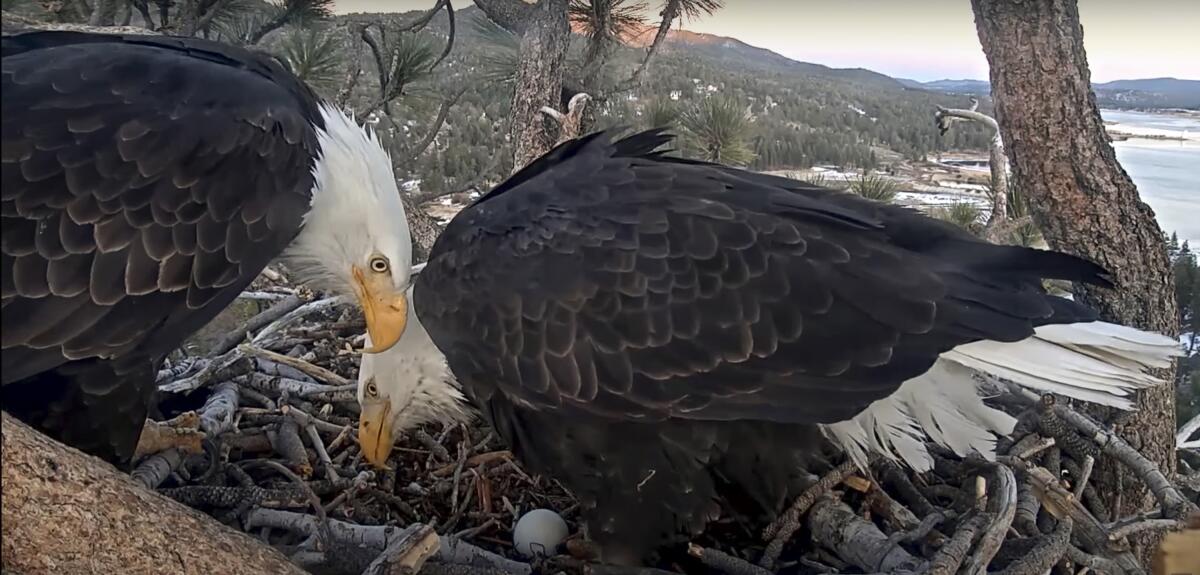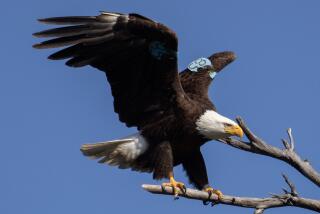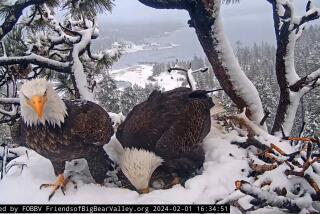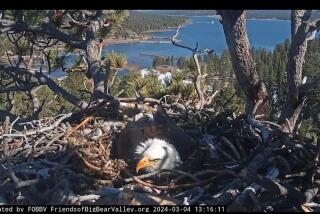Pair of bald eagle eggs in nest near Big Bear unlikely to hatch, experts say

It looks like Big Bear’s world famous bald eagles, Jackie and Shadow, won’t be welcoming new eaglets anytime soon.
Thousands of watchers have been anxiously checking in on a live camera on YouTube, anticipating the hatching of two eggs that have been incubating for more than a month in a nest in a tree high above the San Bernardino National Forest.
More than 17,000 people watched at one point over the weekend as Jackie was covered in snow during this weekend’s winter storm, sitting still on the nest and bearing the cold to keep the two eggs warm.
But on Monday, Friends of Big Bear Valley confirmed what many fans and onlookers had feared after the eggs showed no sign of hatching more than 40 days after they were laid. The organization noted that most eagle eggs tend to hatch within about 35 days.
“It appears now that Jackie and Shadow’s eggs are not going to hatch this time,” the organization, which runs the livestream camera, posted on its Facebook page Monday.
It’s unclear what may have happened to prevent the two eggs from hatching. The eggs rest in a nest in an area of the forest that is off-limits to visitors, and animal experts say the recent series of storms were likely not to blame.
“They could have not been fertilized, or could have stopped developing somewhere along the process for any of a variety of conditions and reasons,” the group wrote on Facebook. “Without seeing what was going on inside the eggs during each step of the process, we have no way to know what happened. We will simply trust that nature knows best what it is doing and why.”
Sandy Steers, executive director of Friends of Big Bear Valley, assured viewers over the weekend that despite the cold and snowy storm these past few days, the two eagles are well equipped by nature to withstand the extreme temperatures and keep the two eggs warm.
Still, there are a variety of reasons why the eggs may not have hatched.
Two other eggs that Jackie laid years ago failed to hatch and were attacked by predators, Steers noted. Video showed the cracked eggs still had a yolk inside rather than a developing chick.
That could suggest the eggs were not fertilized, which could have occurred again this year, she said.
About a week ago, Shadow and Jackie were also both seen leaving the eggs alone for up to two hours, which is considered odd behavior when eagles are caring for eggs.
“It’s sad to me that they had that interruption, but we don’t know if that changed anything,” Steers said at the time.
On Monday, Jackie was still sitting on the snowy nest. At one point, she was seen getting up to eat some meat left on the side of the nest. Both eggs were visible.
On Facebook, Steers wrote that the two eagles have in the past continued sitting on the eggs for weeks, even though it was clear they would no longer hatch.
“As always, we will patiently watch to see what happens from here,” she wrote. “We will allow ourselves to be open, curious and learning from nature ween though the sadness in our hearts.”
More to Read
Sign up for Essential California
The most important California stories and recommendations in your inbox every morning.
You may occasionally receive promotional content from the Los Angeles Times.











